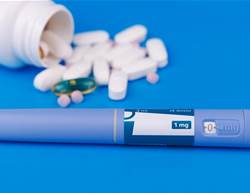While it probably doesn’t come up in your regular happy hour conversation, itchy nipples happen – and probably more often than most people realise.
“Nipple itching is fairly common,” says dermatologist Gary Goldenberg. In fact, he says, people may experience these symptoms at any point in their life. Well, sure: while it’s good to know we’re not the only ones struggling with itchy nipples, it doesn’t exactly help with the discomfort!
To get proper relief for itchy nipples, it’s important to know what’s causing them in the first place. Here’s what could be behind your nipple itchiness – and what to do about it.
What causes itchy nipples?
There are actually a lot of potential reasons why you might develop itchy nipples. “Some people are more prone to developing irritated breasts and nipples at some point due to genetics or certain lifestyle behaviours,” says dermatologist Ife J. Rodney, founding director of Eternal Dermatology Aesthetics and professor of dermatology at Howard University and George Washington University. In other situations, your itchy nipples may be caused by an underlying health condition or even something as simple as what you’re wearing.
Doctors say these are some of the seven most common reasons why you might experience itchy nipples.
1. You have eczema
Eczema is a chronic health condition that affects the skin, causing redness, dryness itching and sometimes infections, according to the Australasian Society of Clinical Immunology and Allergy (ASCIA). When eczema worsens it is called an eczema flare and usually there is no single factor for an eczema flare. Eczema flares can be triggered by a range of irritants or for no obvious reason. Eczema patches usually show up in the backs of the knees, crooks of the elbows, back of the neck and face, but they can also surface on your nipples. “Skin conditions like eczema can happen anywhere on the body,” Dr. Rodney says.
2. Your clothes don’t fit properly
One more reason to make sure you're wearing the right bra size! Regularly wearing a bra or top that’s too tight can cause friction against your nipples, irritating them in the process, Dr. Goldenberg says. That irritation can lead to an itchy feeling.
3. Your skincare products are irritating
Soaps and moisturising creams can irritate your skin, especially the delicate tissue that makes up your nipples, Dr. Rodney says. This can lead to a condition known as contact dermatitis, which is skin irritation caused by a specific trigger (like your scented lotion).
4. Your laundry detergent is causing issues
Laundry detergent can include harsh cleaning agents and fragrances that can also cause contact dermatitis, Dr. Rodney points out. If you wash your bras and sports bras with a scented detergent, there’s a chance it could be a trigger.
5. You’re pregnant or breastfeeding
Pregnancy and nursing can cause your breasts and nipples to expand, stretching the skin in the process – and that can lead to irritation and itching. If you’re breastfeeding, you’re also at risk of developing a condition known as thrush, which is essentially a yeast infection that can wind up your nipples, the Royal Women's Hospital explains. That can cause you to feel nipple pain, along with an itching and burning sensation.
6. You don’t have proper support when you exercise
A loose-fitting sports bra or one that’s just not supportive enough can lead to itchy nipples, Dr. Goldenberg says. Here’s why: If the support isn’t there, your breasts (and nipples) will move around more, increasing friction against them. Cue the irritation and itchiness!
7. You’re dealing with psoriasis
Like eczema, psoriasis can also impact your nipples. There are many forms of psoriasis, but the most common is plaque psoriasis – this causes patches of thick, red skin and silvery scales, according to Healthdirect. And, like eczema, it can show up on your nipples, Dr. Rodney says.
How to treat itchy nipples
The right treatment for itchy nipples ultimately depends on the cause. However, experts say these may help:
- Wear bras that fit well, and change out of your sweaty sports bra as soon as possible.
- Choose bras made of cotton instead of lace or other potentially-irritating materials. (Yes, yes, you can still wear your cute lingerie for special occasions!)
- Limit tight-fitted tops, like those made with spandex.
- Wash your clothes with a fragrance-free laundry detergent.
- Use fragrance-free moisturiser and soap designed for sensitive skin.
“We don’t recommend scratching the skin, using hydrogen peroxide, or other home treatments, as it may worsen the issue,” Dr. Rodney says. “You can, however, moisturise the area as you’d do any part of the skin with a moisturiser that locks in hydration and reduces irritation of sensitive skin.”
When to see your doctor about itchy nipples
If you’ve tried the hacks above and you’re struggling, it’s time to seek professional advice. That’s also true if things get worse. “Chronic, frequent irritation along with redness, swelling, cracked skin, bleeding, or discharge is a sign to see a doctor,” Dr. Rodney says. “We can assess the skin, diagnose the issue, and provide a range of topical or in-office solutions to help.”
Your doctor will also be able to diagnose a skin condition like eczema, thrush or psoriasis, or order allergy testing, Dr. Goldenberg says. They can also prescribe prescription-strength medication, if it’s needed.
Just don’t hesitate to see your doctor if you’re uncomfortable. “Self-diagnosing and treating at home can worsen the issue and delay relief,” Dr. Rodney says.










